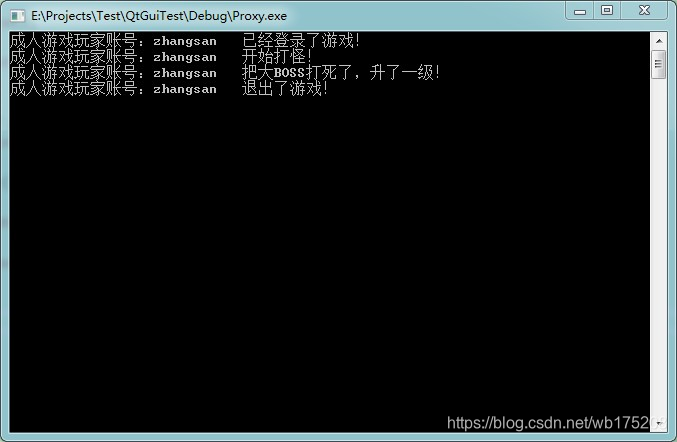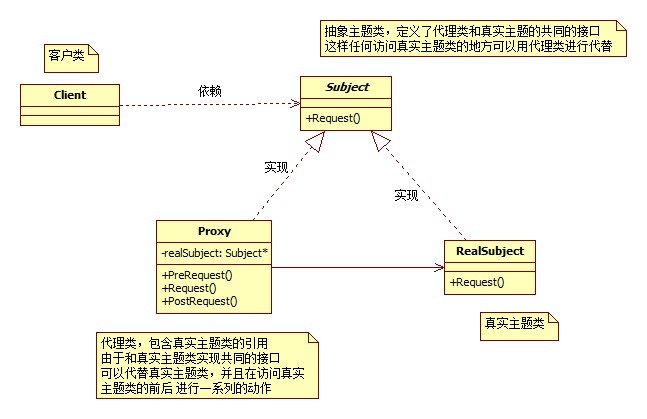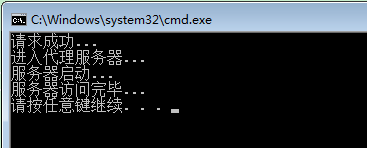代理模式
代理模式介绍
今天继续学习设计模式,今天我们来学习代理模式。其实这个模式呢在我们的生活早已经运用起来了。笔者看到这个模式就联想到了代理商。我们客户买东西一般都是经过代理商的,代理商和真正的生成产品的公司进行对接,因为代理商有钱嘛可以搞垄断赚差价嘛。其实在软件设计中的代理模式和我们现实生活中很类似。在设计模式中,我们的代理模式是这样的,客户端并不能直接访问真正的主题对象,只能通过代理对象进行间接的访问,这样我们就可通过代理对象来控制对真实主题对象的访问,可以在访问前后做一些动作,比如校验什么之类的呀。下面我们看一下标准的代理模式模型图。
代理模式标准模型图
从图中可以,为啥我们的代理对象能代理真实的主题对象 干事呢?很重要一点,他们都继承实现共同的接口。这样在需要访问真实主题对象是都可以使用代理对象 进行访问控制。
代理服务器案例
在了解上面代理模式相关知识后,这个代理服务器访问的案例也就不难理解了。访问真正的服务器,需要通过代理服务器,代理服务器进行用户名密码校验,通过才允许访问真实服务器。
代理服务器模型图
代理服务器代码
-
#define _CRT_SECURE_NO_WARNINGS
-
#include <iostream>
-
using
namespace
std;
-
//抽象类,抽象的主题类
-
class AbstractServer
-
{
-
public:
-
virtual void Request() =
0;
-
};
-
//真正主题类,具体提供服务的类
-
class RealServer:
public AbstractServer
-
{
-
virtual void Request()
-
{
-
cout <<
"服务器启动..." <<
endl;
-
}
-
-
};
-
//代理服务器,非真正的服务器,访问真正服务器必须通过代理服务器
-
class ProxyServer :
public AbstractServer
-
{
-
public:
-
ProxyServer(
string name,
string pwd)
-
{
-
this->name = name;
-
this->pwd = pwd;
-
this->server =
new RealServer;
-
}
-
// 和 真正主题类实现共同的接口,对外可以提供一致的接口!
-
virtual void Request()
-
{
-
if (!CheckUser())
-
{
-
cout <<
"用户名或者密码错误..." <<
endl;
-
return;
-
}
-
cout <<
"请求成功..." <<
endl;
-
PreRequest();
-
this->server->Request();
-
PostRequest();
-
}
-
private:
-
//访问服务器前 进行的动作,可以控制对真实主题类的访问
-
bool CheckUser()
-
{
-
if (
"admin" ==
this->name &&
"123456" ==
this->pwd)
-
{
-
return
true;
-
}
-
return
false;
-
}
-
//真正访问服务器前 进行的动作,这里进行安全
-
void PreRequest()
-
{
-
cout <<
"进入代理服务器..." <<
endl;
-
}
-
//访问服务器之后 进行的动作
-
void PostRequest()
-
{
-
cout <<
"服务器访问完毕..." <<
endl;
-
}
-
string name;
-
string pwd;
-
private:
-
AbstractServer* server;
-
};
-
-
//客户端 通过登录代理服务器 访问 真实服务器
-
int main(int argc, char *argv[])
-
{
-
AbstractServer *proxy =
new ProxyServer(
"admin",
"123456");
//登录代理服务器
-
proxy->Request();
//通过代理服务器 访问真正服务器
-
-
return EXIT_SUCCESS;
-
}
运行结果
代理模式很容易理解,就是代替别人去做某一件事,打个比方,我们需要买水果,一般是去超市或者水果店买水果,很少有人去果园买水果,果园是生产水果的地方,但很少出售水果,在这里,水果店,超市就成了代理。
首先定义一个抽象类,提供所有的函数接口。
定义卖水果的抽象类,也就是接口,果园与超市都要继承这个类。
#pragma once
class CSellFruits//定义一个抽象类
{
public:
CSellFruits(void);
virtual ~CSellFruits(void);
virtual void sellapple()=0; //定义接口,卖苹果
virtual void sellorange()=0;//定义接口,卖橘子
};
#include "SellFruits.h"
CSellFruits::CSellFruits(void)
{
}
CSellFruits::~CSellFruits(void)
{
}
2.定义具体类,也就是果园类,果园生产水果,但是一般不买水果
#pragma once
#include "sellfruits.h"
#include <stdio.h>
class COrchard :
public CSellFruits
{
public:
COrchard(void);
virtual ~COrchard(void);
virtual void sellapple();
virtual void sellorange();
};
#include "Orchard.h"
COrchard::COrchard(void)
{
}
COrchard::~COrchard(void)
{
}
void COrchard::sellapple()
{
printf("Sell apple\n");
}
void COrchard::sellorange()
{
printf("Sell orange\n");
}
3.定义代理类,代理卖水果的类
#pragma once
#include "sellfruits.h"
#include "Orchard.h"
#include <stdio.h>
class CProcySellFruits :
public CSellFruits
{
public:
CProcySellFruits(void);
virtual ~CProcySellFruits(void);
virtual void sellapple();
virtual void sellorange();
private:
CSellFruits *p_SellFruits; //传入接口对象
};
#include "ProcySellFruits.h"
CProcySellFruits::CProcySellFruits(void):p_SellFruits(NULL)
{
}
CProcySellFruits::~CProcySellFruits(void)
{
}
void CProcySellFruits::sellapple()
{
if(this->p_SellFruits==NULL)
{
this->p_SellFruits=new COrchard(); //用被代理的类实例化
}
this->p_SellFruits->sellapple();//代理果园卖苹果
}
void CProcySellFruits::sellorange()
{
if(this->p_SellFruits==NULL)
{
this->p_SellFruits=new COrchard(); //用被代理的类实例化
}
this->p_SellFruits->sellorange();//代理果园卖橘子
}
4.实际调用
CSellFruits* p=new CProxySellFruits(); //用代理类卖水果,然后强转为基类
p->SellApple();
p->SellOrange();
版权声明:最终版权归YBAidam所有 https://blog.csdn.net/Aidam_Bo/article/details/81116034
C++设计模式 - 代理模式详解一
2018-12-17 22:38:26 更多
版权声明:本文为博主原创文章,遵循 CC 4.0 BY-SA 版权协议,转载请附上原文出处链接和本声明。本文链接:https://blog.csdn.net/wb175208/article/details/84984169
代理模式:提供一种可以对真实对象的访问对象,隐藏真实的对象,去除真实对象的非必要的职责。
大家都喜欢玩游戏,单机版游戏如红警、CS、暗黑了等(不小心就暴露了年龄),网络游戏如传奇、魔兽以及吃鸡游戏、王者荣耀等,作为一个会写程序的游戏玩家,咱们通过编程来实现玩游戏的过程。
- 1.接口基类
首先提取出一个接口基类,这个基类中值定义了游戏的基本流程,登陆账号、打游戏、升级、退出账号等。
#pragma once
#include <string>
//游戏玩家接口
class IPlayer {
public:
IPlayer();
IPlayer(std::string account, std::string pwd);
~IPlayer();
//登录游戏
virtual void login();
//玩游戏
virtual void play();
//升级
virtual void update();
//退出登录
virtual void logout();
protected:
std::string _account;//账号
std::string _password;//密码
};
1234567891011121314151617181920212223242526
#include "IPlayer.h"
IPlayer::IPlayer(std::string account, std::string pwd) {
this->_account = account;
this->_password = pwd;
}
IPlayer::IPlayer() {
}
IPlayer::~IPlayer() {
}
void IPlayer::login() {
}
void IPlayer::play() {
}
void IPlayer::update() {
}
void IPlayer::logout() {
}
12345678910111213141516171819202122232425262728
好,游戏的基本接口已经定义完成了。下面咱们定义两种基本的游戏玩家,一种是成人游戏玩家,一种是学社游戏玩家。因为现在国家对于游戏有比较严格的控制,对于小学生的游戏玩家也是有时间上的限制的。
- 2.成人游戏玩家
#include "IPlayer.h"
IPlayer::IPlayer(std::string account, std::string pwd) {
this->_account = account;
this->_password = pwd;
}
IPlayer::IPlayer() {
}
IPlayer::~IPlayer() {
}
void IPlayer::login() {
}
void IPlayer::play() {
}
void IPlayer::update() {
}
void IPlayer::logout() {
}
IPlayer* IPlayer::getProxy() {
return nullptr;
}
1234567891011121314151617181920212223242526272829303132
#include "AdultPlayer.h"
#include <stdio.h>
AdultPlayer::AdultPlayer(std::string account, std::string pwd)
:IPlayer( account, pwd) {
}
AdultPlayer::~AdultPlayer() {
}
void AdultPlayer::login() {
printf("成人游戏玩家账号:%s 已经登录了游戏!\n", _account.c_str());
}
void AdultPlayer::play() {
printf("成人游戏玩家账号:%s 开始打怪!\n", _account.c_str());
}
void AdultPlayer::update() {
printf("成人游戏玩家账号:%s 把大BOSS打死了,升了一级!\n", _account.c_str());
}
void AdultPlayer::logout() {
printf("成人游戏玩家账号:%s 退出了游戏!\n", _account.c_str());
}
1234567891011121314151617181920212223242526
以上就是定义了一个成人的游戏玩家,那么咱们定义一个成人游戏者玩游戏的场景。
int main() {
//成人玩家
IPlayer* player = new AdultPlayer("zhangsan", "123456");
player->login();
player->play();
player->update();
player->logout();
return 0;
}
12345678910111213
运行一下:

- 3.学生玩家
class StudentPlayer :public IPlayer {
public:
StudentPlayer(std::string account, std::string pwd);
~StudentPlayer();
//登录游戏
void login()override;
//玩游戏
void play()override;
//升级
void update()override;
//退出登录
void logout()override;
};
123456789101112131415161718
StudentPlayer::StudentPlayer(std::string account, std::string pwd)
:IPlayer(account, pwd) {
}
StudentPlayer::~StudentPlayer() {
}
void StudentPlayer::login() {
printf("学生游戏玩家账号:%s 已经登录了游戏!\n", _account.c_str());
}
void StudentPlayer::play() {
printf("学生游戏玩家账号:%s 开始打怪!\n", _account.c_str());
}
void StudentPlayer::update() {
printf("学生游戏玩家账号:%s 把大BOSS打死了,升了一级!\n", _account.c_str());
}
void StudentPlayer::logout() {
printf("学生游戏玩家账号:%s 退出了游戏!\n", _account.c_str());
}
12345678910111213141516171819202122232425
咱们定义一个学生游戏玩家的使用场景,放假了,小明同学跟妈妈申请想玩游戏,妈妈也同意了;
int main() {
//学生玩家
IPlayer* player2 = new StudentPlayer("xiaoming", "123456");
player2->login();
player2->play();
player2->update();
player2->logout();
return 0;
}
1234567891011121314
运行一下:

小明玩游戏玩的很高兴,但是快乐的日子总是短暂的,要开学了,小明就不能玩游戏了,但是如果长时间不玩的话,他的游戏级别就上不去,下次和同学聊天的时候,就感觉比别的同学低了几级,就不能跟其他的同学炫耀了,一想到这些小明同学就心痛不已。
后来他的同学强强告诉他可以让游戏代理来帮他打怪继续升级,小明一想太棒了,自己不用玩游戏,但是自己的游戏级别还是不停的在上升。
- 4.游戏代理
class ProxyStudentPlayer :public IPlayer {
public:
ProxyStudentPlayer(std::string name, std::string account, std::string pwd);
ProxyStudentPlayer(std::string name,IPlayer* player);
~ProxyStudentPlayer();
//登录游戏
void login()override;
//玩游戏
void play()override;
//升级
void update()override;
//退出登录
void logout()override;
private:
std::string _proxyName;
IPlayer* _studentPlayer;
};
12345678910111213141516171819202122232425
ProxyStudentPlayer::ProxyStudentPlayer(std::string name, std::string account, std::string pwd)
:IPlayer(account, pwd) {
_proxyName = name;
_studentPlayer = new StudentPlayer(account, pwd);
}
ProxyStudentPlayer::ProxyStudentPlayer(std::string name, IPlayer* player) {
_proxyName = name;
_studentPlayer = player;
}
ProxyStudentPlayer::~ProxyStudentPlayer() {
}
void ProxyStudentPlayer::login() {
printf("游戏代理:%s 使用", _proxyName.c_str());
_studentPlayer->login();
}
void ProxyStudentPlayer::play() {
printf("游戏代理:%s 使用", _proxyName.c_str());
_studentPlayer->play();
}
void ProxyStudentPlayer::update() {
printf("游戏代理:%s 使用", _proxyName.c_str());
_studentPlayer->update();
}
void ProxyStudentPlayer::logout() {
printf("游戏代理:%s 使用", _proxyName.c_str());
_studentPlayer->logout();
}
1234567891011121314151617181920212223242526272829303132333435
上学期间每次要打游戏的时候,小明都会让游戏代理大强帮自己打游戏,他只要把游戏账号登陆上就可以了。
int main() {
//学生玩家
IPlayer* player2 = new StudentPlayer("xiaoming", "123456");
//代理玩家1
ProxyStudentPlayer* proxyStudent = new ProxyStudentPlayer("大强", player2);
proxyStudent->login();
proxyStudent->play();
proxyStudent->update();
proxyStudent->logout();
return 0;
}
1234567891011121314151617
运行一下:

但是他的同学强强嫌每次都要自己登陆很麻烦,就直接把自己的游戏账号和密码告诉游戏代练大强,让大强用自己的账号密码来登录玩游戏升级。
ProxyStudentPlayer* proxyStudent2 = new ProxyStudentPlayer("大强", "qiangqiang", "123456");
proxyStudent2->login();
proxyStudent2->play();
proxyStudent2->update();
proxyStudent2->logout();
123456789
运行一下:

























 2336
2336











 被折叠的 条评论
为什么被折叠?
被折叠的 条评论
为什么被折叠?








